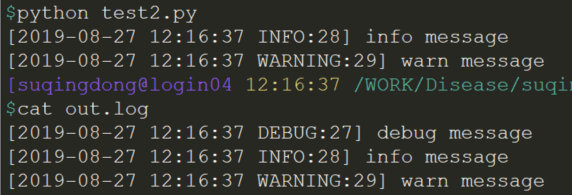1 basicConfig
参数说明
| Format | Description |
|---|---|
| filename | Specifies that a FileHandler be created, using the specified filename, rather than a StreamHandler. |
| filemode | If filename is specified, open the file in this mode. Defaults to 'a'. |
| format | Use the specified format string for the handler. |
| datefmt | Use the specified date/time format, as accepted by time.strftime(). |
| level | Set the root logger level to the specified level. |
| stream | Use the specified stream to initialize the StreamHandler. Note that this argument is incompatible with filename - if both are present, stream is ignored. |
示例
import logginglogging.basicConfig(format='[%(asctime)s %(funcName)s %(levelname)s] %(messsage)s',datefmt='%Y-%m-%d %H:%M:%S',level=logging.DEBUG)logger = logging.getLogger('TEST')logger.debug('start')logger.info('done')
可选的format
| Attribute name | Format | Description |
|---|---|---|
| args | You shouldn’t need to format this yourself. | The tuple of arguments merged into msg to produce message, or a dict whose values are used for the merge (when there is only one argument, and it is a dictionary). |
| asctime | %(asctime)s |
Human-readable time when the LogRecord was created. By default this is of the form ‘2003-07-08 16:49:45,896’ (the numbers after the comma are millisecond portion of the time). |
| created | %(created)f |
Time when the LogRecord was created (as returned by time.time()). |
| exc_info | You shouldn’t need to format this yourself. | Exception tuple (à la sys.exc_info) or, if no exception has occurred, None. |
| filename | %(filename)s |
Filename portion of pathname. |
| funcName | %(funcName)s |
Name of function containing the logging call. |
| levelname | %(levelname)s |
Text logging level for the message ('DEBUG', 'INFO', 'WARNING', 'ERROR', 'CRITICAL'). |
| levelno | %(levelno)s |
Numeric logging level for the message (DEBUG, INFO, WARNING, ERROR, CRITICAL). |
| lineno | %(lineno)d |
Source line number where the logging call was issued (if available). |
| module | %(module)s |
Module (name portion of filename). |
| msecs | %(msecs)d |
Millisecond portion of the time when the LogRecord was created. |
| message | %(message)s |
The logged message, computed as msg % args. This is set when Formatter.format() is invoked. |
| msg | You shouldn’t need to format this yourself. | The format string passed in the original logging call. Merged with args to produce message, or an arbitrary object (see Using arbitrary objects as messages). |
| name | %(name)s |
Name of the logger used to log the call. |
| pathname | %(pathname)s |
Full pathname of the source file where the logging call was issued (if available). |
| process | %(process)d |
Process ID (if available). |
| processName | %(processName)s |
Process name (if available). |
| relativeCreated | %(relativeCreated)d |
Time in milliseconds when the LogRecord was created, relative to the time the logging module was loaded. |
| thread | %(thread)d |
Thread ID (if available). |
| threadName | %(threadName)s |
Thread name (if available). |
logging的日志级别
| Level | Numeric value |
|---|---|
CRITICAL |
50 |
ERROR |
40 |
WARNING |
30 |
INFO |
20 |
DEBUG |
10 |
NOTSET |
0 |
修改logger
# ...logger.level = logging.INFO# orlogger.level = 20# orlogger.setLevel(logging.INFO)
2 addHandler
先创建logger,后添加handler
# coding: utf8import sysimport logging# 创建logger,设置levellogger = logging.getLogger('TEST2')logger.setLevel(logging.DEBUG) # handler默认level# 创建formatterformatter = logging.Formatter(fmt='[%(asctime)s %(levelname)s:%(lineno)s] %(message)s',datefmt='%Y-%m-%d %H:%M:%S')# 创建stream handlerhdlr1 = logging.StreamHandler(stream=sys.stderr) # 默认stderrhdlr1.setLevel(logging.INFO) # 重设levelhdlr1.setFormatter(formatter) # 设置formatter# 创建file handlerhdlr2 = logging.FileHandler('out.log', mode='w')hdlr2.setFormatter(formatter)# 为logger添加handlerlogger.addHandler(hdlr1)logger.addHandler(hdlr2) # 可添加多个handlerlogger.debug('debug message')logger.info('info message')logger.warn('warn message')
3 logging.config
通过配置文件的方式初始化logger


